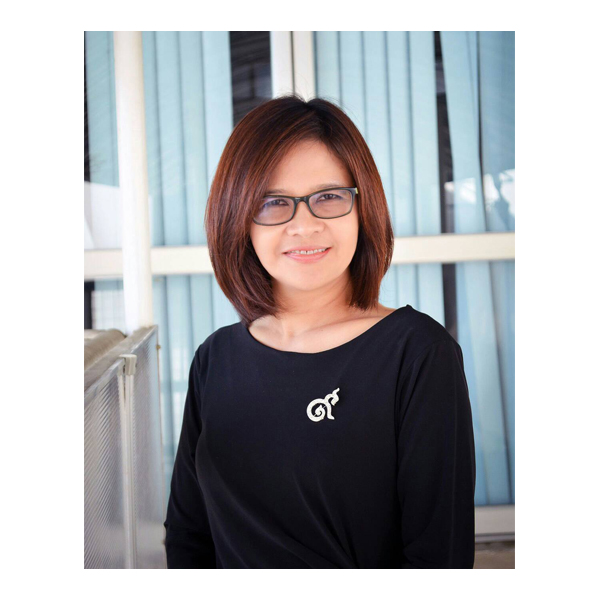
Associate Professor Dr.Ratchada Cressey
Associate Professor Dr. Ratchada Cressey, Ph.D AMS Cancer Research Unit and MT Cancer research Unit, Faculty of Associated Medical Sciences, Chiang Mai University, Thailand Associate Professor of Medical Technology in Clinical Chemistry, and Biomarkers and Molecular Biology of Cancer. Associate Professor Dr. Ratchada Cressey (Maiden name Ratchada Suaeyun) is Associate Professor of Medical Technology in Faculty of Associated Medical Sciences (AMS) at the Chiang Mai University, Thailand. Dr Cressey received her Ph.D in molecular Oncology from The Northern Institute for Cancer Research (NICR), University of Newcastle upon Tyne, UK. She completed her doctoral research on the cellular roles of MDM2 and its alternatively sliced variants. She has been a lecturer in at the division of Clinical Chemistry, AMS since 2001. Her main research area is revolved around various aspects of molecular biology of cancer i.e. genetic polymorphism and microRNA profiles toward the risk of cancer as well as the identification and characterization of a potential novel cancer biomarker.
Book
1. Ratchada Cressey. Diabetes: Basic principle and Related Laboratory Testes (in Thai). 2nd edition, Chiang Mai University Press, Chiang Mai, Thailand, 2015. 142p.
Communications
No Data.
Selected current projects
No Data.
Research Interests
1. Biomarkers and molecular cell biology of lung cancer development
2. genetic polymorphism and microRNA profiles toward the risk of lung cancer development
Research Patents
No Data.
Research Publications
1. Cressey R, Kumsaiyai W and Mangklabruks A. Daily consumption of banana marginally improves blood glucose and lipid profile in hypercholesterolemic subjects and increases serum adiponectin in type 2 diabetic patients. Indian J Exp Biol. 2014; 52(12):1173-81
2. Suradej B, Pata S, Kasinrerk W and Cressey R. Glucosidase II exhibits similarity to the p53 tumor suppressor in regards to structure and behavior in response to stress signals: A potential novel cancer biomarker. Oncol Rep. 2013; 30(5):2511-9
3. Saosathan S, Chewaskulyong B, Saeteng S, Lertprasertsuke, Kasinrerk W and Cressey R. (2010) Expression and production of auto-antibodies to livin and surviving anti-apoptotic proteins in lung cancer. The Assoc Med Tech Thailand. 2010, 37 (3): 3013-3025.
4. Klinchid J, Chewaskulyoung B, Lertprasertsuke N, Saeteng S, Kasinrerk W and Cressey R. Effect of combined genetic polymorphisms on lung cancer risk in Northern Thai women. Cancer Genet Cytogenet. 2009; 195(2): 143-9
5. Cressey R, Pimpa S, Chewaskulyong B, Lertprasertsuke N, Saeteng S, Tayapiwatana C, Kasinrerk W. Simplified approaches for the development of an ELISA to detect circulating autoantibodies to p53 in cancer patients. BMC Biotechnol. 2008; 8: 16 (highly access)
6. Cressey R, Chotpadiwetkul R, Lertprasertsuke N and Kasinrerk W. (2008) Expression of Apoptosis Inhibitor Survivin : Common and Independent of p53 Aberration in Thai Cancer Patients. CMU. J. Nat. Sci. 2008; 6(2): 185-194
7. Anderson JJ, Challen C, Atkins H, Suaeyun R, Crosier S, Lunec J. MDM2 RNA binding is blocked by novel monoclonal antibody h-MDM2-F4-14. Int J Oncol. 2007; 31(3): 545-55.
8. Cressey R, Klinchid J, Saeteng S, Lertprasertsuke N and Chewaskulyoung B. Genetic polymorphisms of metabolizing enzymes involved in detoxification of tobacco carcinogens and matrix metalloproteinase-1 in relation to lung cancer in Northern Thailand. J Thorac Oncol. 2007; 2 (8): 562.
9. Cressey R, Pimpa S, Tontrong W, Watananupong O, Lertprasertsuke.N. Expression of cyclooxygenase-2 in colorectal adenocarcinoma is associated with p53 accumulation and hdm2 overexpression. Cancer Lett. 2006; 233(2): 232-9
10. Cressey R, Watananupong O, Lertprasertsuke N, Vinitketkumnuen U. Alteration of protein expression pattern of vascular endothelial growth factor (VEGF) from soluble to cell-associated isoform during tumorigenesis. BMC Cancer 2005, 5:128
11. Watananupong O, Lertprasertsuke N, Vinitketkumnuan U and Cressey R (2004) Expression of Vascular Endothelial Growth Factor and tumor progression in adenocarcinoma. The Assoc Med Tech Thailand. 32 (3): 804-815.
12. Sangkasard S, Leartprasertsuk N, Vinitketkumnuen U and Cressey R Expression of cyclooxygenase-1 and -2 and clinicopathologic features of colorectal cancer in Northern Thailand. Asia. Pac. J Cancer Prev 2004, 5(1), 44-49
13. Cressey R, Thongsang W, Tanapat T, Sungkasart S, and Lertprasertsuk N (2003) Accumulation of p53 protein and its correlation with tumor progression in Thai cancer patients. The Assoc Med Tech Thailand., 31(1): 344-354
14. Kinouchi T, Suaeyun R, Chewonarin T, Intiyot Y, Arimochi H, Kataoka K, Akimoto S, Vinitketkumnuen U and Ohnishi Y. (1997) Chemopreventive effects of Thai medicinal plants on formation of azoxymethane-induced DNA adducts and aberrant crypt foci in the rat colon. Mutation Research/Fundamental and Molecular Mechanisms of Mutagenesis. 379 (1) : S181
15. Suaeyun, R., Kinouchi, T., Arimochi, H., Vinitketkumnuen, U., and Ohnishi,Y., (1997) Inhibitory effect of lemon grass (Cymbopogus citrus Stapf) on formation of azoxymethane-induced DNA adduct and aberrant crypt foci in rat colon. Carcinogenesis, 18(5), 949-955
16. Vinitketkumnuen U and Suaeyun R (1995) Anti-mutagenicity of coconut tip extract. Chiangmai. Med. Bulletin. 34 (2): 63-66
